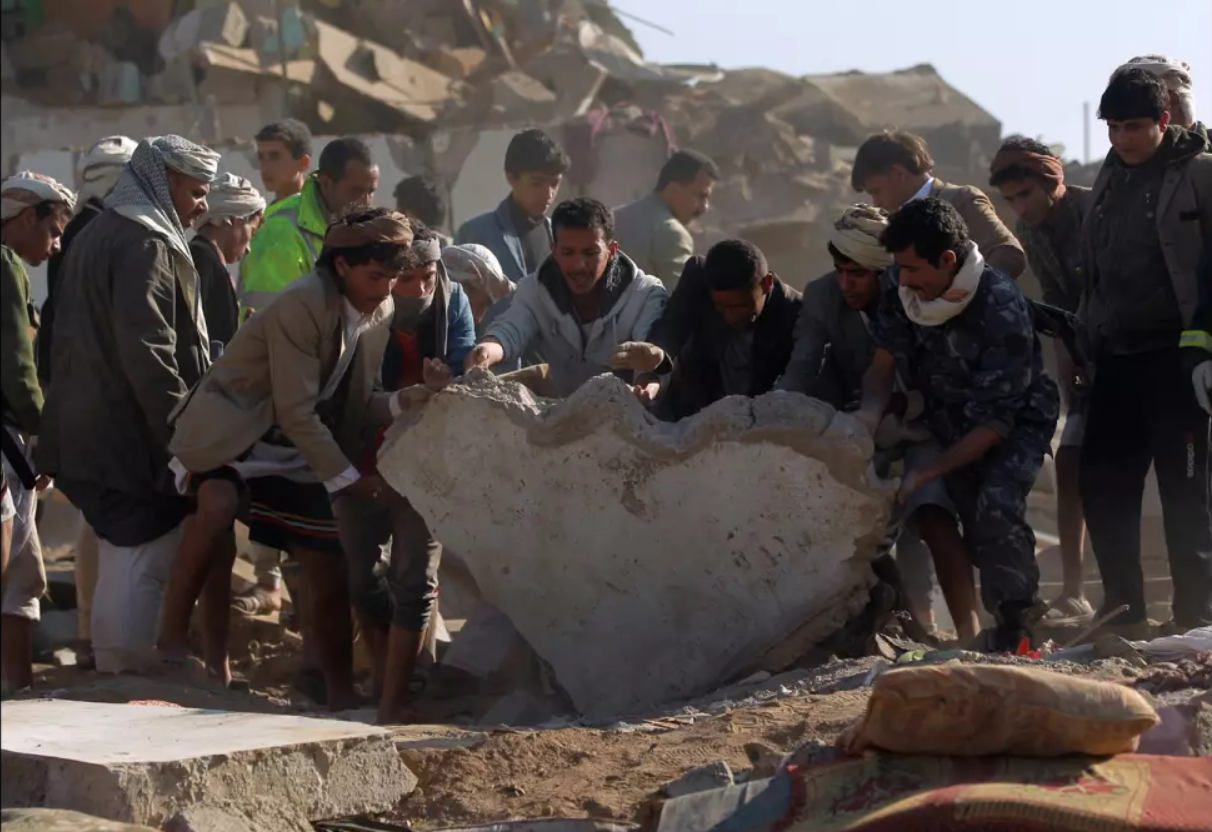2026.02.24 기상청GO
[International News] American Arms in Saudi Hands: A Lethal Mix for Yemeni Civilians
| 08-25 18:40
By Alexander Lee

The search for survivors in the rubble of buildings destroyed during Saudi airstrikes near Sana Airport on March 26. (Mohammed Huwais / AFP/Getty Images)
In December 2016, President Barack Obama limited the sale of U.S. weaponry to Saudi Arabia in response to the rampant civilian fatalities in the savage conflict in Yemen.
Although he could have implemented this policy sooner and the measures could have been more comprehensive, it was nonetheless a progressive move. That is, until Donald Trump assumed office a month later and reversed the decision, resuming arms sales.
Consequently, U.S.-manufactured weapons supplied to Saudi coalition forces have been used to attack wedding celebrations and even a school bus.
Troubled by the ongoing civilian casualties, Congress sought to terminate U.S. involvement in the Yemeni war, where Saudi and allied forces aim to overthrow the Iranian-supported Houthi insurgents. However, Trump vetoed the bipartisan resolution. Further, when Congress placed a hold on an $8.1 billion arms deal to the Saudi coalition last year, Secretary of State Michael R. Pompeo circumvented the decision by declaring an ‘emergency’ in light of Iran’s 'malicious' actions in the region.
Therefore, the arms sales have persisted.
This month, the State Department’s independent inspector general acknowledged the problematic nature of arming the Saudi coalition. The inspector general’s report concluded that the U.S. failed to adequately evaluate the risks and implement measures to mitigate civilian deaths from American-made precision-guided bombs in Yemen.
The devastating war in Yemen has led to the world’s most severe humanitarian crisis. Millions of Yemenis are grappling with cholera, famine, displacement, and economic collapse.
Consequently, the U.S. has been implicated in the turmoil, raising questions about its dedication to global human rights and adherence to the rules of war.
Representative Tom Malinowski (D-N.J.) firmly stated, 'We should not be complicit in war crimes or human rights violations. If our weapons are used in such crimes, and if the purchasing country disregards our counsel for change, we are implicitly involved. The Saudis have persistently ignored our advice while continuing to accept our weapons.'
But how does it happen that American-made weapons consistently end up being used against civilians halfway around the globe? The process is straightforward: U.S. arms manufacturers produce and sell military equipment such as planes, helicopters, bombs, missiles, and spare parts. The U.S. government sanctions these sales, and then the Saudis and their allies deploy the weapons.
In 2018, a U.S.-made GBU-12 bomb was used to strike a wedding in Yemen, resulting in 21 fatalities, including 11 children. A U.S.-produced GBU-16 laser-guided bomb was discovered at the site of a 2016 bombing of a residential area in Yemen that claimed 23 lives. Moreover, a U.S.-manufactured MK 82 bomb decimated a school bus in Yemen in 2018, killing 40 children.
These instances are just a few examples from a long list of atrocities.
Today, the U.S. is the leading global arms dealer, with Saudi Arabia being its top customer. American companies involved in these sales include General Dynamics, Raytheon, and Boeing.
The longstanding U.S. stance has been that arms sales are beneficial, as they enable allies to address their defense needs, potentially preventing U.S. involvement in their conflicts while also creating domestic jobs and profits.
However, how can we, as a nation, absolve ourselves of moral responsibility when our weapons are consistently misused in a manner that is both persistent and predictable? It is surely feasible to halt arms sales to countries that repeatedly offend. When survivors share images of bomb fragments stamped with 'Made in the USA,' it is evident that change is necessary.
A U.N. report from last September even suggested that the U.S. could be legally complicit due to its role in arming and supporting the Saudi coalition.
Human Rights Watch, an organization that doesn't typically advocate for arms sale prohibitions, has called for one in this case.
Andrea Prasow, acting Washington director of Human Rights Watch, explained, 'The Saudi-led coalition's attacks are so heinous and unresponsive to international or domestic pressure that we believe the countries selling them weapons are effectively participating in the conflict.'
Trump has asserted that he shares concerns about civilian casualties and claims the U.S. is coaching coalition forces to refine their targeting methods.
Indeed, American advisers have collaborated with the Saudis at their operations headquarters in Riyadh, evaluating risks of collateral damage, verifying that proposed targets are not on the no-strike list, and confirming the accuracy of underlying intelligence.
But these efforts have proven largely futile because civilian casualties typically occur during 'dynamic strikes.' In these situations, a coalition aircraft patrols Yemen, communicates with an ally on the ground, and requests real-time targeting advice.
Ultimately, the Saudis have exhibited little interest in altering their behavior, not due to a lack of knowledge, training, or advice, but rather a lack of political will. Similarly, the U.S. has demonstrated a reluctance to extricate itself from this humanitarian disaster.
Reporter Alexander Lee alexanderlee_24@newsyn.co.kr
- 주요뉴스 뉴스속보
서비스안내
상호: 영남매일신문(주) | 사업자등록번호: 506-81-85807 | 대표: 강호성 | 신문등록번호 : 부산 가00021 / 인터넷신문등록번호 : 부산, 아00272
전화: 051-867-3909 | 팩스: 051-861-3463 | 주소: 부산광역시 연제구 중앙대로 1111, 1701호 (연산동, 위드타워)
copyright ⓒ 2015 newsyn.co.kr All right reserved. | web@newsyn.co.kr


 즐겨찾기추가
즐겨찾기추가

 RSS
RSS








